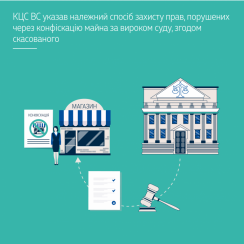Contact center of the Ukrainian Judiciary 044 207-35-46

In 2003, according to a court verdict, the plaintiff’s share of a store was confiscated. This property was sold at the commodity exchange, and in the future its owners were repeatedly changed. In 2004, the Supreme Court of Ukraine overturned the verdict and closed the criminal case against the plaintiff. In 2016, the plaintiff filed a lawsuit to apply the consequences of the invalidity of a void transaction - the sale and purchase agreement of 2004, reclaiming previously owned parts of the store premises from a bona fide purchaser.
The case has been tried several times.
The courts of cassation repeatedly overturned the decisions of the courts of first and appeal instances and when remitting the case for a new hearing pointed to the need to examine the method of judicial protection of the violated rights chosen by the plaintiff.
The last decision of the court of first instance, the decision of which was upheld by the court of appeal, partially granted the claim; it demanded in favor of the plaintiff the previously owned by her real estate under Art. 388 of the Civil Code of Ukraine.
At the same time, the court took into account the ECtHR judgment on the application of the plaintiff of April 30, 2020 in the case of Svirgunets v. Ukraine (application No. 38262/10), which established a violation by the state of Ukraine of Art. 1 of the First Protocol to the Convention for the Protection of Human Rights and Fundamental Freedoms.
The Supreme Court composed of a panel of judges of the First Judicial Chamber of the Civil Cassation Court overturned the previous judgments regarding the recovery of property from the person who filed the cassation appeal, and dismissed the claim in this part, having made the following legal conclusions.
The application of a particular civil law remedy depends both on the content of the right or interest sought to be protected, and on the nature of its violation, non-recognition or contestation. Such right or interest must be protected by the court in an effective manner.
Claiming property through vindication applies to relations of a proprietary nature, in particular, if there are no contractual relations between the owner and the possessor of the property and the property is held by the possessor not on the basis of the transaction concluded with the owner.
In cases on the recovery of property from someone else's illegal possession, there are exclusively private legal relations between the parties to the dispute, and in the case under review, the plaintiff lost the disputed property as a result of the state exercising its power in public law relations.
The Supreme Court took into account that in the case under review, the property was removed from the possession of the plaintiff in compliance with the court verdict, which was later overturned.
Given that the enforcement of a court sentence in criminal proceedings is carried out on behalf of the state using coercion against the will of the owner sentenced to a certain type of criminal legal punishment, it is the state that bears all the risks of applying such authoritative public law decisions, including the risks associated with possible errors of the court and law enforcement agencies when bringing such a person to criminal responsibility.
There was a special legally regulated procedure for protecting the violated rights of the applicant, who was subjected to unlawful criminal prosecution, according to which the financial body of the state, if funds for property were received by the state budget, or another body that received funds for this property, must reimburse the owner of the property for its value or return this property, and the decision of this body can be appealed in court.
The risks of negative consequences of the state's implementation of its power policy cannot be transferred to another private person, in particular, to a bona fide purchaser.
The Constitution of Ukraine, the Convention for the Protection of Human Rights and Fundamental Freedoms and the Civil Code of Ukraine determine the inviolability of the right to property and the impossibility of depriving a person of his property. At the same time, these legal norms imply the possibility of an exception from the above general rule - only on condition that the deprivation of a person's right to property is provided for by law, is carried out in the interests of society (for reasons of public necessity) and is proportional (in particular, it provides for compensation, reimbursement of the value of property).
In addition, the Supreme Court pointed out that the claim for the application of the consequences of the invalidity of a void transaction as a way to protect the violated right in disputed legal relations had no independent legal significance, since even if it is satisfied, the plaintiff's property rights will not be restored. The facts of further expropriation of the disputed property make it impossible to use such a method of protecting the interests of the plaintiff as restitution.
Resolution of the Supreme Court of June 1, 2022, in case No. 688/2507/16 (proceedings No. 61-3428св21) – https://reyestr.court.gov.ua/Review/104748121.
This and other legal positions of the Supreme Court can be found in the Database of Legal Positions of the Supreme Court - lpd.court.gov.ua/login.